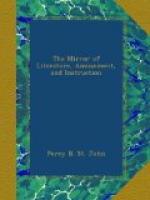“Lord Leash?”—“Oui, Monsieur;—mais,
Fanchette, apportez le livre ici pour Monsieur—le
voila.”—“Ah, ha! Sir John
Leach; I see.”—“Ah qu’il
est bon enfant! qu’il est gai!” exclaimed
the garcon. “Ah! qu’il est
aimable!” sighed Fanchette—Enter
De Molin the banker’s little bureau at Lausanne—(by
the way, it is the favourite chamber of Gibbon the
historian, and if you pay the house a visit from motives
of curiosity respecting its former occupant, you will
be happy to be allowed to remain and converse with
the actual owner, for a more honourable, liberal, and
better-informed man, does not exist)—there,
I say, in the glass over the mantlepiece, will you
see the card of Sir John Leach. Milan—Florence—the
same. At Torlogna’s the same. Then
at Naples: go to San Carlos’; and if you
get behind the scenes, ask for Braccini, the poeta
of the theatre, who has been long in England; “Cospetto
di Bacco!” he will exclaim: “il degn
uomo, quel Vice Cancelliere: il Cavaliere Licci!—Gran
Dio! quale talento per la musica!-Cappari! egli ha
guadagnato i cuori di tutte le donne Napolitane."[3]
I certainly expect to hear him some day astonish the
bar, by unwittingly striking up “O Pescator delle
onde,” or “Sul margine del Rio,”
in the Rolls Court; and, as in ancient Greece (’tis
said) pleadings were chanted, let us yet hope to hear
an argument preferred to the tune of “They are
a’ noddin, noddin, noddin;” an answer
stated andante; a reply given in a bravura,
and judgment pronounced presto. With all
his faults (if they be such, which I do not admit),
the present Master of the Rolls is a good judge, and
an able man;—“un peu vif, peut-etre,”
as Fanchette might say; and it is more agreeable than
otherwise, to see one who has devoted his life to the
study of the law, enjoying himself in lighter pursuits,
after having attained rank and dignity in the profession;
and after having punctually and satisfactorily executed
the important duties of the day, seeking at its close,
and participating in the gaiety which society offers.
It speaks a good heart and cheerful temper; whereas,
when we hear a distaste declared for music, and that
of the highest character, we cannot but call to mind
“He who has not the concord of sweet sounds”
within himself;—but I will not pursue the
quotation. Besides, were there persons fools
enough to blame Sir John for his social propensities,
he might answer them as the Parisian coachman did.—“What
was that?”—“Why, a French Jehu
was tried in 1818, for some accident caused by his
cabriolet, before the Criminal Court of Paris; when,
having heard the evidence, the President of the Tribunal
declared that he stood acquitted, but that the court
felt it its duty to blame him, and that he was blamed
accordingly.” “Blamed!” exclaimed
Jehu; “Blamed!—I don’t quite
understand your Honor;—but—but—will
it prevent my handling the ribands, and driving the
wehicle?”—“No!”
said the judge. “Then, with all respect
for your Honor, I just laugh at it,” said coachee,
bowing. “And so do I,” said the president
also, in rising to leave the court.—New
Monthly Magazine.




